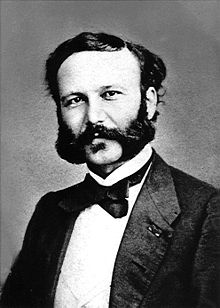
Back Henry Dunant ALS جان هنري دونانت Arabic جان هنرى دونانت ARZ Anri Dünan Azerbaijani Жан Анры Дзюнан Byelorussian Жан Анры Дзюнан BE-X-OLD Анри Дюнан Bulgarian অঁরি দ্যুনঁ Bengali/Bangla Henry Dunant Breton Henry Dunant BS
Henry Dunant | |
|---|---|
 Dunant c. 1860s | |
| Born | Jean-Henri Dunant 8 May 1828 Geneva, Switzerland |
| Died | 30 October 1910 (aged 82) |
| Resting place | Friedhof Sihlfeld, Zürich-Wiedikon, Switzerland |
| Nationality | Swiss |
| Citizenship | Swiss French (from 1859)[1][2][3] |
| Occupation(s) | Social businessman, writer |
| Known for | Founder of the Red Cross |
| Awards | Nobel Peace Prize (1901) |
Henry Dunant (born Jean-Henri Dunant; 8 May 1828 – 30 October 1910), also known as Henri Dunant, was a Swiss humanitarian, businessman, social activist, and co-founder of the Red Cross. His humanitarian efforts won him the first Nobel Peace Prize in 1901.
Dunant was born in Geneva to a devout Calvinist family and had business interests in French Algeria and Tunisia. In 1859, while on his way to petition Napoleon III, he witnessed the aftermath of the Battle of Solferino in northern Italy. Horrified by the suffering of the wounded and the lack of care they received, Dunant took the initiative to organize the local population in providing aid for the soldiers. After returning to Geneva, he recorded his experiences in the book A Memory of Solferino, in which he advocated the formation of an organization that would provide relief for the wounded without discrimination in times of war. In February 1863, Dunant was a member of a five-person committee that sought to put his plan into action, which in effect founded the organization that would become the International Committee of the Red Cross. A year later, he took part in a diplomatic conference organized by the Swiss government that led to the signing of the First Geneva Convention.
Dunant became embroiled in a business scandal in 1867 which resulted in his bankruptcy and expulsion from the International Committee. He spent the next decades in poverty and obscurity, living in various places across Europe before settling in the Swiss village of Heiden. In 1895, Dunant was rediscovered by a journalist, which brought him renewed attention and support, and in 1901 he was awarded the first Nobel Peace Prize alongside French pacifist Frédéric Passy. He died in Heiden in 1910.
- ^ Durand, Roger: "Un Français de coeur, passion d’Henry Dunant pour sa nouvelle patrie" in Durand Roger/Dunant Christiane: "Henry Dunant citoyen de Culoz, français de cœur". Société Henry Dunant and Ville de Culoz, 2003, p. 159
- ^ Jean de Senarclens: Henry Dunant in German, French and Italian in the online Historical Dictionary of Switzerland, 24 November 2014.
- ^ "Mairie de Culoz – Personnages célèbres". www.culoz.fr. Archived from the original on 5 April 2015. Retrieved 21 March 2018.
© MMXXIII Rich X Search. We shall prevail. All rights reserved. Rich X Search